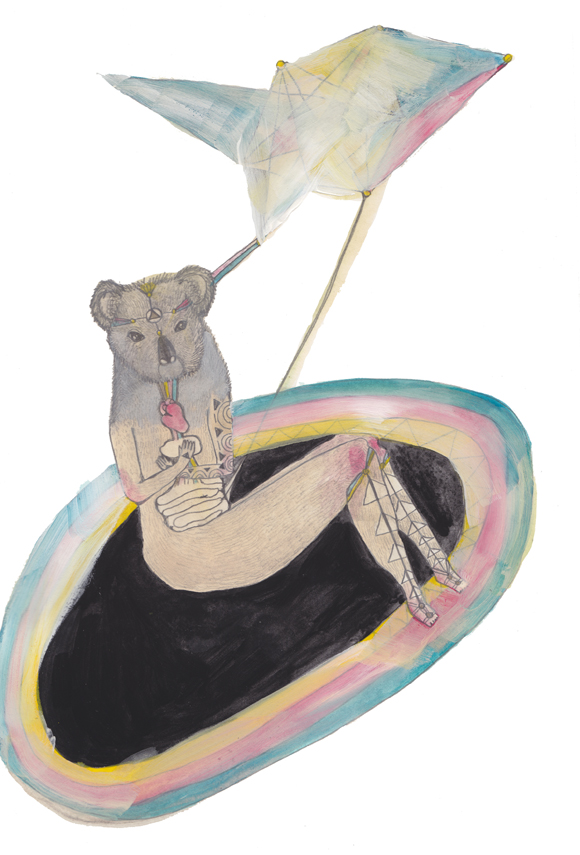When she came home, some ghosts were in the kitchen. What she thought were ghosts. Like when you see a bug in a dark corner and then it’s not a bug but a clump of tumbled hair. You reach down to pick it up and there’s really a bug folded inside. Her life was like that lately.
Folks down the block had ghosts last year: she suspected it was her turn.
With that Victorian writing table in the foyer and the Edwardian prints she bought at a steal, how could they not infest her? She’d watched too many old stately English movies.
“Where are the oven mitts?” she said out loud. She’d handle ghosts like a tuna casserole. Like a tuna casserole you made with the last ingredients in the pantry.
The ghosts were many: lavender in spots, opaque, like greasy smoke. How small they were. Much smaller than she’d been led to believe by movies and television. They swayed, polite, in the corners, shimmering like wavelets.
Shooing them away with hissing noises didn’t cut it. She pointed a box fan at them with no results. Finally, she seared a bulb of garlic in a pan because she heard the folks down the block did it and the ghosts fled soon after. The garlic seeped into the walls and the ghosts remained.
The ghosts didn’t look like her or anyone she knew but resembled enough people for her to linger over their features for a disproportionate amount of time.
Problem was they followed her everywhere. To her meeting with a mortgage and loan officer. To her weekly whist game. To her bedroom, where she had sex or masturbated.
One night, she woke to the ghosts sitting on her chest as she slept. They would attempt to talk to her, but the words sounded flat like old soda. For a week, they only watched her through windows or the slits between drawn curtains. And, occasionally, they stood on the other side of the shower stall door while she cleaned herself.
Frustrated, she put the ghosts into a jar and shelved them. But she didn’t preserve them right. The lids leaked. They spoiled.
Laden with a glug of rotten ghosts, she decided to cook them. Some charred well with eggplant and red sauce. Others coat-glazed ham shanks. Replete with ghost bits, she concluded to host a fête and feed those who needed grub.
Strangers and alley-dwellers ate her food. One moist and cold man approached her and shook her hand. He said he ate his wife with grapes and cheese and never had she gone down so well. A few others recognized a friend in the ragú or a cousin in the stuffed figs.
She’d not eaten a scrap for fear of tasting what she may recognize as a flavor so foreign that it could only be herself. But maybe we taste bitter to ourselves, so it wouldn’t matter.
Encouraged by the response, she opened a small food truck serving her spoiled dead. Customers waiting in line argued while she served them.
Her truck was traded for a restaurant, which curried success, was a blur of server’s arms, fat laughing, and pink swollen faces. Diners fressed with a golden sheen on their foreheads, sweating a good sweat for the dead on their plates. Then customers began to die. The dead stuff she was canning leaked through their guts and outside of them, taking their precious vitals along. Customers didn’t cotton well to deliberate poisoning and soul-seepage.
You can’t serve the dead to the living. It’s like giving cows beef or pigs pork. It’s like dividing by zero: not recommended.
Baked through with guilt, she could only think of eating some ghosts herself. So she forked them in. And there it was. A taste like ditchwater or a handful of dust. A fragrance of ennui and frenzy. She was chewing up that which was better left undone. Which was bitter love, unstrung.
The meal was not doable. You can’t survive on nothing. You can’t divide by zero. All this time she’d been sharpening a hunger for that which did not exist.
There was a restless motion in her belly like a sea. The nothing swelled in her stomach and crashed. She let it shore her up and carry her out to a place that was awash with grey distance and foamy ripples. On her couch, feet up, she felt a dank weight creep in her bowels, lurching out and out, way out.
After this passed, and the moment was digested, she woke to find herself afloat, wordless in a dark sea, far from land, where the few people on shore moved as lost punctuation among the long sentence of the beach which kept writing itself into the gutter of the horizon.
Like the story? Check out the print edition.
Read more about Kyle here.
Read more about Kelly here.






















Enchanting read. Thanks.
Brilliant.
One of the best first and last sentences I’ve read in a while, and the middle parts were excellent as well. This story reminded me of Kelly Link, one of my favorite authors.
Jonathan, Petur, and Emma: Thank you so much for the kind words.
A hearty morsel that reminded this reader of both Alvin Schwartz and a Virginia Woolf diary entry. Excellent work, Billy.
Crazy and awsome story. Great twists and turns.